-
Henry Kissinger
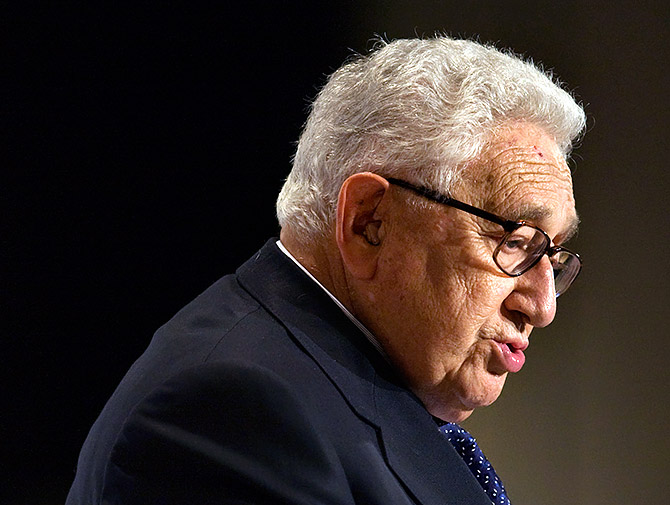
The former United States Secretary of State won in 1973 "for the 1973 Paris agreement intended to bring about a cease-fire in the Vietnam war and a withdrawal of the American forces". Then North Vietnamese General Le Duc Tho was also awarded the Peace Prize but declined to accept. The decision to award Kissinger was fraught with debate. Critics said Kissinger's alleged involvement as Secretary of State in Operation Condor and the US bombing campaigns in Cambodia made a mockery of the prize.
Photograph: Shaun Best/Reuters
-
Mother Teresa

On October 17, 1979, Mother Teresa was awarded the Nobel Peace Prize for her humanitarian work with the poor. Although she has passed away, Mother Teresa is still an omnipresent role model for do-gooders, religious or secular, across the globe. Mother Teresa devoted herself to help Kolkata's poor. She founded the Missionaries of Charity and encouraged former teachers and students from her former school to join her in her work. Throughout the 1950s and 1960s, Mother Teresa created a leper colony, a nursing home, an orphanage, a family clinic, and many mobile health clinics to help the struggling residents. By the time she died in 1997, her Missionaries of Charity had expanded to nearly 4,000 nuns with 610 foundations in 123 countries across the globe.
Photograph: Andrew Wong/Reuters
-
United Nations High Commissioner for Refugees
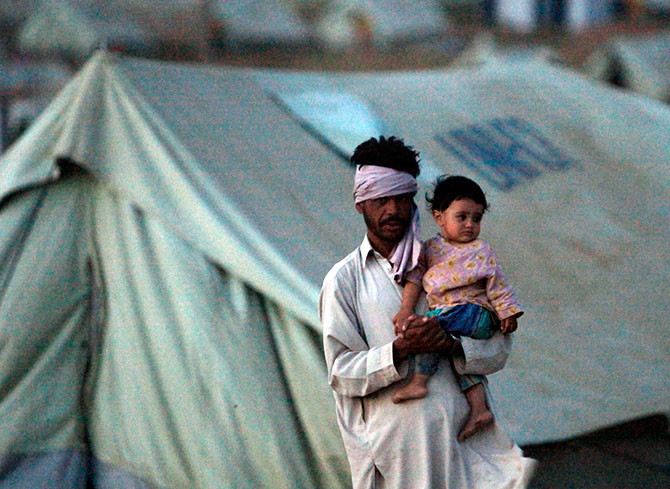
In 1981, the Nobel committee recognised the UNHCR's great efforts to repatriate refugees in Asia, Africa and Latin America in the 1970s. The UNHCR won the Nobel Peace Prize twice -- first in 1954 and again in 1981.
Photograph: Adrees Latif/Reuters
-
Desmond Tutu

Desmond Tutu is one of South Africa’s most well-known human rights activists, winning the 1984 Nobel Peace Prize for his efforts in resolving and ending apartheid.
Known as the voice of the voiceless Black South Africans he was an outspoken critic of apartheid. Tutu also supported the economic boycott of South Africa, while constantly encouraging reconciliation between various factions associated with apartheid. In his human rights work, Tutu formulated his objective as “a democratic and just society without racial divisions,” and set forth demands for its accomplishment, including equal civil rights for all, a common system of education and the cessation of forced deportation.
Photograph: Mike Hutchings/Reuters
-
United Nations Peace-Keeping Forces
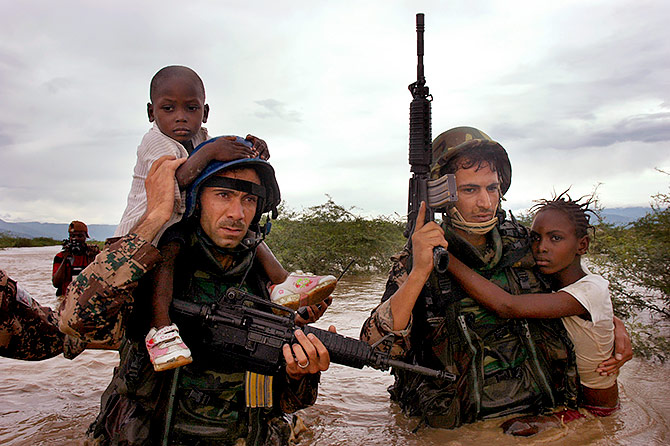
Towards the end of the Cold War, the Nobel Committee awarded the Peace Prize to military personnel who had served as observers and UN soldiers. From 1948 to 1988, over 500,000 persons from 53 states took part in the UN's peacekeeping operations. Of them, 733 lost their lives.
In its Award Ceremony Speech, the Committee said the Nobel Peace Prize for 1988 should be regarded as a recognition of the whole UN organisation. "It ought to be understood as a serious comment on the fact that we must, united and with our whole hearts, invest in the United Nations."
Photograph: Evens Felix/Reuters
-
Dalai Lama

In 1989, the Dalai Lama, the exiled religious and political leader of Tibet, was awarded the Nobel Peace Prize in recognition of his nonviolent campaign to end the Chinese domination of Tibet.
The Nobel Committee gave the Dalai Lama, then aged 54, the prize for 'opposing the use of violence in his struggle for the liberation of Tibet.'
'He has instead advocated peaceful solutions based upon tolerance and mutual respect in order to preserve the historical and cultural heritage of his people,' the chairman said.
Photograph: Yuan Jia-hung/Reuters
-
Aung San Suu Kyi
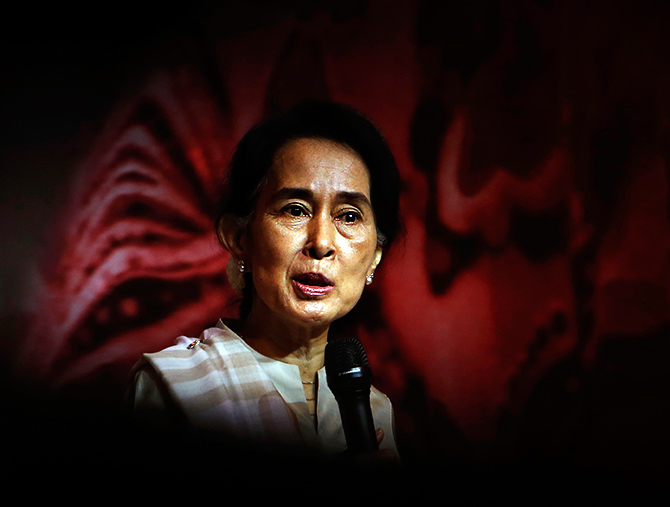
Myanmar's Aung San Suu Kyi won in 1991 for "her non-violent struggle for democracy and human rights.
The Myanmar leader led the opposition to the military junta that had ruled Burma since 1962. She was one of the founders of the National League for Democracy, and was elected secretary general of the party. Inspired by Mahatma Gandhi, she opposed all use of violence and called on the military leaders to hand over power to a civilian government.
However, she has come into criticism and many even called for the stripping of the prize in recent times in the light of a United Nations report that said Myanmar’s military carried out mass killings of Muslim Rohingya.
Photograph: Edgar Su/Reuters
-
Nelson Mandela & F W de Klerk
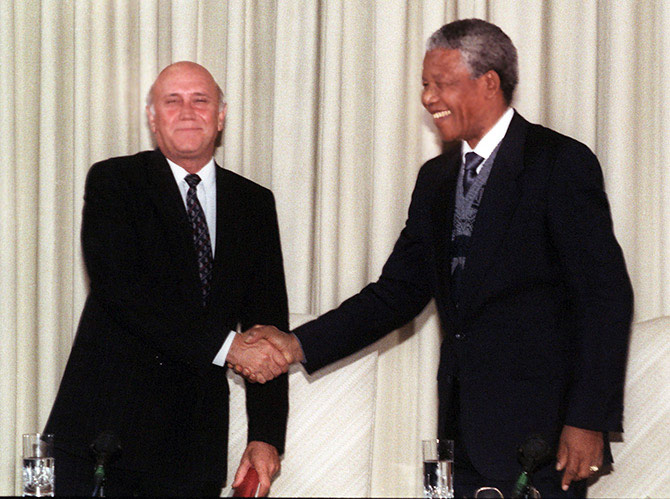
The Nobel Peace Prize 1993 was awarded jointly to Nelson Mandela and Frederik Willem de Klerk "for their work for the peaceful termination of the apartheid regime, and for laying the foundations for a new democratic South Africa."
They were credited with accomplishing a political miracle -- the transformation of their country into a multi-racial democracy without civil war. The transfer of power was fraught with difficulty and although their political rivalry spilled over into the public arena, the relative peace afforded to South Africa was undeniable.
Photograph: Juda Ngwenya/Reuters
-
Yasser Arafat, Shimon Peres & Yitzhak Rabin

Israel’s Prime Minister Rabin, its Foreign Minister Peres and Palestinian Liberation Organization leader Arafat jointly won the 1994 prize after agreeing to build a peace framework -- the Oslo Accords.
The award recognised the boldness and courage of the three men in fashioning the basic accord on Palestinian self-government as a step toward ending a long-term conflict.
But many at the time saw Arafat as an unapologetic terrorist and, within months, Rabin had been slain by a Jewish Israeli fanatic. The accords gradually crumbled and almost 25 years later, Mideast peace looks further away than ever.
Photograph: Jerry Lampen/Reuters
-
Jody Williams & International Campaign to Ban Landmines

Jody Williams received the Nobel Peace Prize in 1997 for her work to ban landmines through the International Campaign to Ban Landmines, which shared the Peace Prize with her that year. At that time, she became the 10th woman in its almost 100-year history to receive the Prize.
Landmines are the scourge of poor countries. 100 million un-detonated anti-personnel mines still remain buried in 60 countries after wars and armed conflicts. Their purpose is to maim or kill soldiers, but it is the civilian population that suffers most. Each year 25,000 people are injured.
In 1997, through its many efforts, the IBCL got representatives of 120 countries to sign the Ottawa Convention prohibiting landmines.
Photograph: Reuters
-
Medecins Sans Frontieres
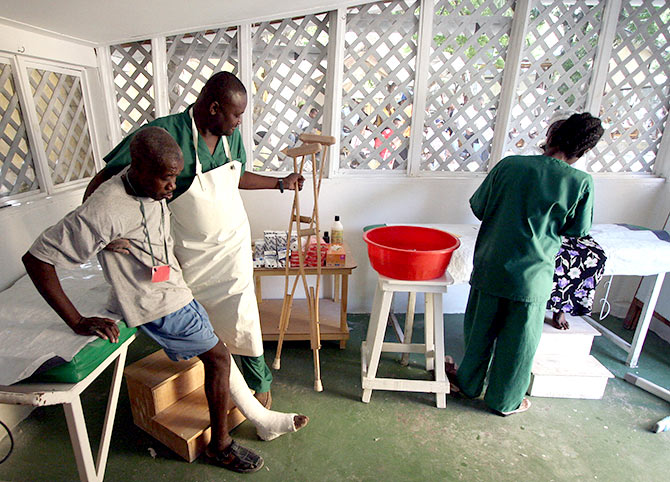
Medecins sans Frontieres, the French aid group, won the Nobel peace prize for its pioneering work in disaster relief around the world in 1999.
The five-member Nobel Committee said the award to the group, known in English as Doctors Without Borders, recognised its "pioneering humanitarian work on several continents".
By intervening so rapidly in disasters, the Nobel committee said, Medecins sans Frontieres, calls public attention to humanitarian catastrophes.
"By pointing to the causes of such catastrophes, the organisation helps to form bodies of public opinion opposed to violations and abuses of power," the committee went on.It was the first Nobel peace prize given solely to an organisation since United Nations peacekeeping forces won in 1988.
Photograph: Eduardo Munoz/Reuters
-
Jimmy Carter

The former United States president won the peace prize in 2002 “for his decades of untiring effort to find peaceful solutions to international conflicts, to advance democracy and human rights, and to promote economic and social development.”
One of his key achievements as US president was mediating the peace talks between Israel and Egypt in 1978. The Nobel Committee had wanted to give Carter the prize that year for his efforts, along with Anwar Sadat and Menachim Begin, but was prevented from doing so by a technicality -- he had not been nominated by the official deadline.
Carter and his wife Rosalynn created the Atlanta-based Carter Center in 1982 to advance human rights and alleviate human suffering. Since 1984, they have worked with Habitat for Humanity to build homes and raise awareness of homelessness. Among his many accomplishments, Carter has helped to fight disease and improve economic growth in developing nations and has served as an observer at numerous political elections around the world.
Photograph: Brian Snyder/Reuters
-
Al Gore
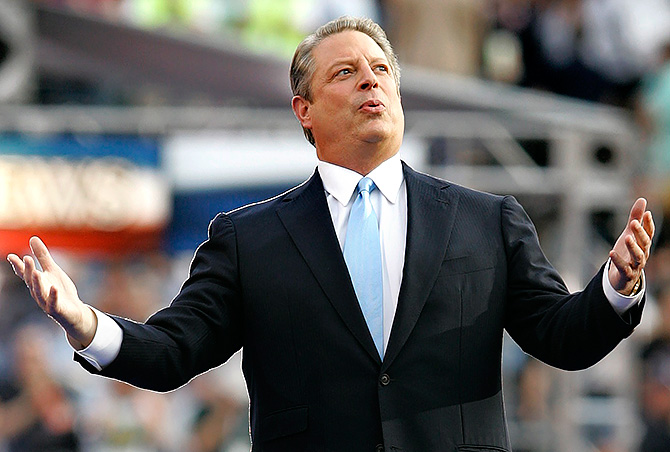
In 2007, US Vice President Al Gore and members of the UN Intergovernmental Panel on Climate Change were awarded the Nobel Peace Prize for their efforts to communicate the dangers of climate change.
Public perception of climate change was considerably altered by the Oscar-winning documentary An Inconvenient Truth, produced by former US Vice President Al Gore using reports published by the UN Intergovernmental Panel on Climate Change. The Stockholm jury awarded the prestigious prize to Gore and to members of the IPCC for their continuous efforts to conduct research and inform policy makers and the general public on the issue.
Photograph: Larry Downing/Reuters
-
Barack Obama

Barack Obama was awarded the Nobel Peace Prize in 2009. He took the award not as a reward for accomplishments but as a “call to action.”
The committee said that the prize was being given for "his extraordinary efforts to strengthen international diplomacy and cooperation between peoples".
The Peace Prize did indeed spur backlash. Some of Obama’s detractors had a point. The Nobel Peace Prize has been given to political dissidents and freedom fighters with long histories of great personal sacrifice against brutal oppression. By comparison, Obama’s record, though laudable, was thin. And then there was the immediate irony of granting the Peace Prize to a president whose country was embroiled in war.
Photograph: Kevin Lamarque/Reuters
-
Liu Xiaobo

Prominent dissident Liu Xiaobo has been the only Chinese citizen to be awarded a Nobel Peace Prize while still residing in China. In 2010, the now deceased activist won the prize for being the "foremost symbol" of the struggle for human rights in China.
Photograph: Berit Roald/Scanpix Norway/Reuters
-
European Union

In 2012, the EU received the Nobel Peace Prize for advancing the causes of peace, reconciliation, democracy and human rights in Europe.
The EU decided to dedicate the Nobel Peace Prize money to children who are denied the chance of growing up in peace.
The Norwegian Nobel Committee said its decision was based on the stabilising role the EU has played in transforming most of Europe from a continent of war to a continent of peace.
Photograph: Bundesregierung/Guido Bergmann/Pool/Reuters
-
Malala Yousafzai & Kailash Satyarthi
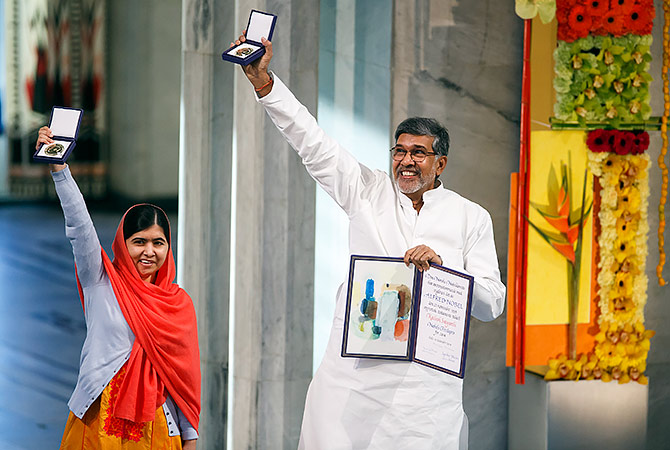
Pakistani education activist Malala Yousafzai and Indian child rights campaigner Kailash Satyarthi won the peace prize in 2014.
The Nobel committee described both laureates as "champions of peace".
Malala was shot in the head by a Taliban gunman in 2012 in Pakistan after coming to prominence for her campaigning for education for girls.
She won for what the Nobel committee called her “heroic struggle” for girls’ right to an education. She is the youngest ever winner of the prize.
Satyarthi, the Nobel committee said, had maintained the tradition of Mahatma Gandhi and headed various forms of peaceful protests.
“Showing great personal courage, Kailash Satyarthi, maintaining Gandhi’s tradition, has headed various forms of protests and demonstrations, all peaceful, focusing on the grave exploitation of children for financial gain,” the committee said. “He has also contributed to the development of important international conventions on children’s rights.”
The Nobel committee said it “regards it as an important point for a Hindu and a Muslim, an Indian and a Pakistani, to join in a common struggle for education and against extremism”.
Photograph: Cornelius Poppe/NTB Scanpix/Pool/Reuters
-
Denis Mukwege & Nadia Murad

Congolese doctor Denis Mukwege and Yazidi activist Nadia Murad won in 2018 "for their efforts to end the use of sexual violence as a weapon of war and armed conflict."
Mukwege has treated victims of sexual violence in the Democratic Republic of the Congo for most of his adult life. He founded the Panzi Hospital, which supports survivors of sexual assault.
He practices medicine in eastern Congo, which has been called the "rape capital of the world" by UN officials.
Murad herself is a victim of sexual war crimes.
She is a member of the Yazidi minority in northern Iraq and was taken captive by Islamic State members who had launched an attack on her small village. She was held as a sex slave for three months before escaping from her captors.
Photograph: NTB Scanpix/Haakon Mosvold Larsen/Reuters

















